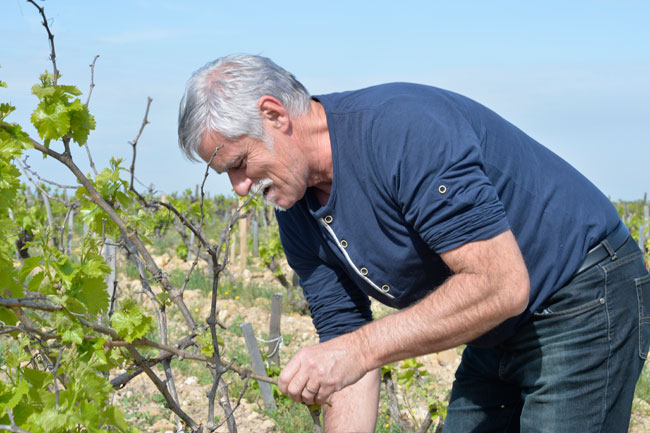We are sorry, this page has not been translated yet.
Domaine de Beaurenard

Brothers Daniel and Frédéric Coulon are the seventh generation to run the well-known Domaine de Beaurenard, and they do so with much love for nature. The 60 hectares of vines in Châteauneuf-du-Pape and Rasteau have been organically cultivated since 2007 and biodynamically since 2011.
Châteauneuf-du-Pape from organic cultivation

Daniel Coulon checks his young vines in the vineyard.
Around half of the vineyards lie in the hills around the village of Châteauneuf-du-Pape with its famous ruin of the Papal summer palace. It was, in particular, Pope John XXII who had this palace built in the 14th century and encouraged the cultivation of wine on the surrounding hills.
The individual location of Boisrenard has been part of the Domaine de Beaurenard since 1695 and is worked exclusively by horse in order not to damage the ancient vines and to prevent any compression of the soil.

Soil preparation using a horse is hard work, but it prevents soil compression and soil erosion – investing in the future.
Respect for nature
But all the other plots are also cultivated with great respect for nature – be it the soils with the large round stones (galets roulées) or the other soil types that are predominantly made up of limestone, sand or clay. The range of grape varieties is wide: All 13 of the varieties permitted for Châteauneuf-du-Pape are present. The four most important red wine varieties are Grenache, Syrah, Mourvèdre and Cinsault with the predominant white varieties being Clairette, Rousanne, Bourboulenc and Grenache Blanc. 25 hectares of vineyard are located in the Appellation Rasteau. This is where their father Paul Coulon built a museum for vineyard and winemaking tools at the foot of the vineyards.

The result of good vegetation with legumes: loose, fertile soil that can retain moisture and enables rich soil life.
Daniel and Frédéric Coulon deliberately restrict the yield to 15 to 20 hectolitres per hectare in order to keep the concentration high in the grapes and not dilute the terroir flavour. All the grapes are harvested by hand, strictly selected and fermented with natural yeast. In the cellar, importance is placed on gentle vinification with as few interventions as possible. Both traditional processes and modern technology have their place here.




